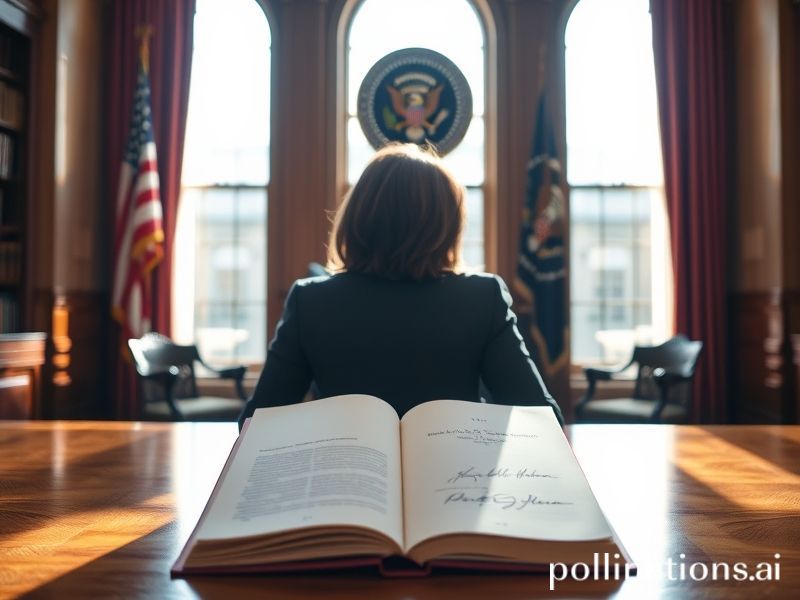World on the Couch: Kamala Harris Re-Releases Her Memoir and the Globe Rewrites the Margins
Kamala Harris, Booked and Cross-Examined: The World Watches America Write Its Own Footnotes
By the time Vice President Kamala Harris announced her memoir-slash-policy-prospectus, “The Truths We Hold: An American Journey” (paperback re-release alert: now with 17 % more hindsight), the planet had already digested three servings of American self-regard this week and was loosening its belt for a fourth. From Lagos to Lisbon, foreign observers greeted the news with that familiar cocktail of fascination and fatigue usually reserved for U.S. election cycles—equal parts “tell me something new” and “please, not another cliff-hanger.”
The book itself—part ancestral travelogue, part prosecutorial greatest-hits mixtape—was originally marketed in 2019, when Harris was still auditioning for the role of America’s first female president. Now, with the paperback arriving as she warms the Naval Observatory’s spare bedroom, the global audience has upgraded its viewing software. The question in Brussels cafés and Seoul newsrooms is no longer “Who is Kamala?” but “What does her story tell us about a superpower that keeps rebooting the same pilot episode?”
Europe, ever the helpful theater critic, reads the memoir as evidence that Washington’s political talent pipeline has been reduced to a single spigot labeled “Presidential Hopeful, Do Not Drink Until Primaries.” German pundits note that Harris devotes only two pages to the Transatlantic relationship, roughly the same space given to her favorite cornbread recipe—an observation that stings like a Riesling hangover. Meanwhile, the French, who consider memoirs a competitive sport, admire her restraint: only one photograph of the author gazing pensively across the Golden Gate Bridge at sunset. Très économique.
Across the Pacific, Chinese state media greeted the reissue with the enthusiasm of a customs officer discovering undeclared durian. Editorials point out that Harris’s tales of courtroom victories against Big Tobacco read like quaint folk legends in a country where the national habit is literally state-subsidized. Still, tabloids can’t resist recycling the chapter where she recounts scolding Xi Jinping about human rights—translated, inevitably, into the headline “Female Prosecutor Gives Uncle Xi A Time-Out.”
In India, the Vice President’s ancestral homeland, the book has become a Rorschach test. Delhi’s nationalist press hails her as “Tamil-American Durga with subpoena powers,” while Kerala’s leftist weeklies grumble that she name-drops idlis but never mentions labor unions. Bollywood producers, ever alert to intellectual property, are rumored to be optioning the chapter on busing in Berkeley for a dance number featuring 200 backup dancers in judicial robes.
Africa, long accustomed to being used as either backdrop or cautionary tale, received the memoir with the weary shrug of a continent that has seen its share of American politicians discover DNA-test roots just in time for campaign season. Nairobi booksellers report brisk sales, mostly to university students mining the footnotes for dissertation citations on diaspora identity and the commodification of struggle. One grad student told our correspondent, “It’s like reading your auntie’s Facebook notes, but with Harvard citations.”
Of course, the book’s real global significance lies in its meta-commentary: a nation that keeps publishing leadership origin stories faster than it can live up to them. Each memoir becomes a futures contract on American promise, traded in airport bookstores from Dubai to Dallas. The rest of the planet, stuck in economy class, flips the pages and wonders whether the in-flight movie will ever sync with the cockpit announcements.
By the final chapter, Harris pivots from prosecutor to prophet, warning that democracies die in darkness—but neglects to mention the blackout is often self-inflicted. International readers underline that passage in red, then close the book and check their own voltage meters.
Conclusion: From the cheap seats of the world theater, “The Truths We Hold” is less a revelation than a reminder—an American mid-season recap dropped into a binge-watching planet already fatigued by reruns. Still, if history is any guide, we’ll queue for the sequel, popcorn in hand, hoping the next episode finally delivers on the hype. Spoiler alert: it won’t, but we’ll be back anyway. The show, for all its plot holes, is still the only one with this production budget.







